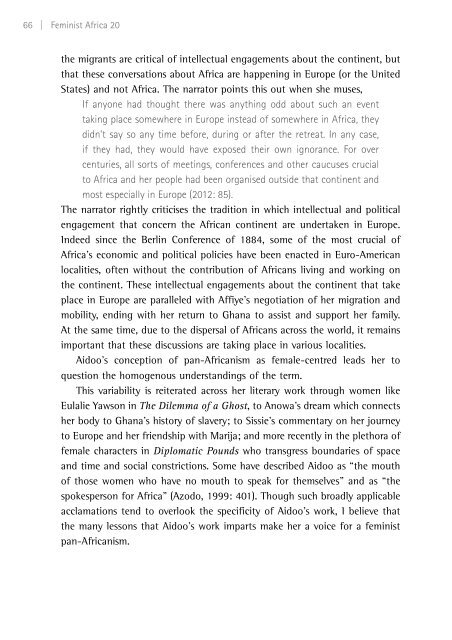You also want an ePaper? Increase the reach of your titles
YUMPU automatically turns print PDFs into web optimized ePapers that Google loves.
66 | Feminist Africa 20<br />
the migrants are critical of intellectual engagements about the continent, but<br />
that these conversations about Africa are happening in Europe (or the United<br />
States) <strong>and</strong> not Africa. The narrator points this out when she muses,<br />
If anyone had thought there was anything odd about such an event<br />
taking place somewhere in Europe instead of somewhere in Africa, they<br />
didn’t say so any time before, during or after the retreat. In any case,<br />
if they had, they would have exposed their own ignorance. For over<br />
centuries, all sorts of meetings, conferences <strong>and</strong> other caucuses crucial<br />
to Africa <strong>and</strong> her people had been organised outside that continent <strong>and</strong><br />
most especially in Europe (2012: 85).<br />
The narrator rightly criticises the tradition in which intellectual <strong>and</strong> political<br />
engagement that concern the African continent are undertaken in Europe.<br />
Indeed since the Berlin Conference of 1884, some of the most crucial of<br />
Africa’s economic <strong>and</strong> political policies have been enacted in Euro-American<br />
localities, often without the contribution of Africans living <strong>and</strong> working on<br />
the continent. These intellectual engagements about the continent that take<br />
place in Europe are paralleled with Affiye’s negotiation of her migration <strong>and</strong><br />
mobility, ending with her return to Ghana to assist <strong>and</strong> support her family.<br />
At the same time, due to the dispersal of Africans across the world, it remains<br />
important that these discussions are taking place in various localities.<br />
Aidoo’s conception of pan-<strong>Africanism</strong> as female-centred leads her to<br />
question the homogenous underst<strong>and</strong>ings of the term.<br />
This variability is reiterated across her literary work through women like<br />
Eulalie Yawson in The Dilemma of a Ghost, to Anowa’s dream which connects<br />
her body to Ghana’s history of slavery; to Sissie’s commentary on her journey<br />
to Europe <strong>and</strong> her friendship with Marija; <strong>and</strong> more recently in the plethora of<br />
female characters in Diplomatic Pounds who transgress boundaries of space<br />
<strong>and</strong> time <strong>and</strong> social constrictions. Some have described Aidoo as “the mouth<br />
of those women who have no mouth to speak for themselves” <strong>and</strong> as “the<br />
spokesperson for Africa” (Azodo, 1999: 401). Though such broadly applicable<br />
acclamations tend to overlook the specificity of Aidoo’s work, I believe that<br />
the many lessons that Aidoo’s work imparts make her a voice for a feminist<br />
pan-<strong>Africanism</strong>.


